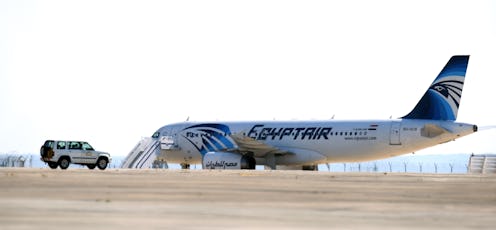News
Did EgyptAir MS804 Send Out A Distress Signal?
In an aviation disaster that is already drawing comparisons with the vexing disappearance of Malaysian Airlines MH370, the disappearance of this flight early in the morning has everyone wondering about one critical piece of information: Did EgyptAir flight MS804 send out a distress signal of some kind? The answer will begin to help investigators figure out exactly what happened, and when. Update: On Thursday morning, Egyptian aviation officials confirmed with the Associated Press that the EgyptAir plane has crashed. The officials, who spoke on the condition of anonymity with AP, said the "possibility that the plane crashed has been confirmed," since flight MS804 never arrived at any of the airports. The officials told AP they will now be searching for debris from the plane.
There are currently mixed reports on whether or not there was some kind of distress signal sent out by the cockpit. An EgyptAir vice chairman told CNN that there was no distress call from the pilot. However, according to Anurag Kotoky, an aerospace beat reporter with Bloomberg Business, a spokeswoman for EgyptAir confirmed that the pilot did send out some sort of distress call.
Whether the crew was able to send out any kind of distress signal to ground crews will be able to reveal some important information to investigators — namely, was the crew aware of any kind of disturbance on the plane? If a distress signal was not able to be sent out, that suggests either that an immediate catastrophic incident could have occurred and the aircraft has been lost, or that control of the plane could have shifted to an unauthorized person or persons, like in an abrupt hijacking scenario, for example. However, none of these have been confirmed.
What has apparently been confirmed by the airline is that an emergency message was received by Egyptian military forces at 2:26 a.m. GMT, or 4:26 a.m. local Cairo time, just under two hours from when the plane last registered on land-based radar stations.
The wording from EgyptAir's social media presence is somewhat vague. However, it does appear to indicate that the signal may have come from an automated emergency location beacon, like the one attached to the so-called "black box" or flight recording device.
According to EgyptAir, the country's military naval and airborne resources have been enlisted to help facilitate the search. The Greek navy is assisting with recovery efforts, too.
EgyptAir is reporting that MS804 was flying from Charles de Gaulle International Airport in Paris, France, to Cairo International Airport in Cairo, Egypt, with 56 passengers and 10 crew on board when it disappeared from radar contact at 37,000 feet with 45 minutes left of scheduled flight time.
